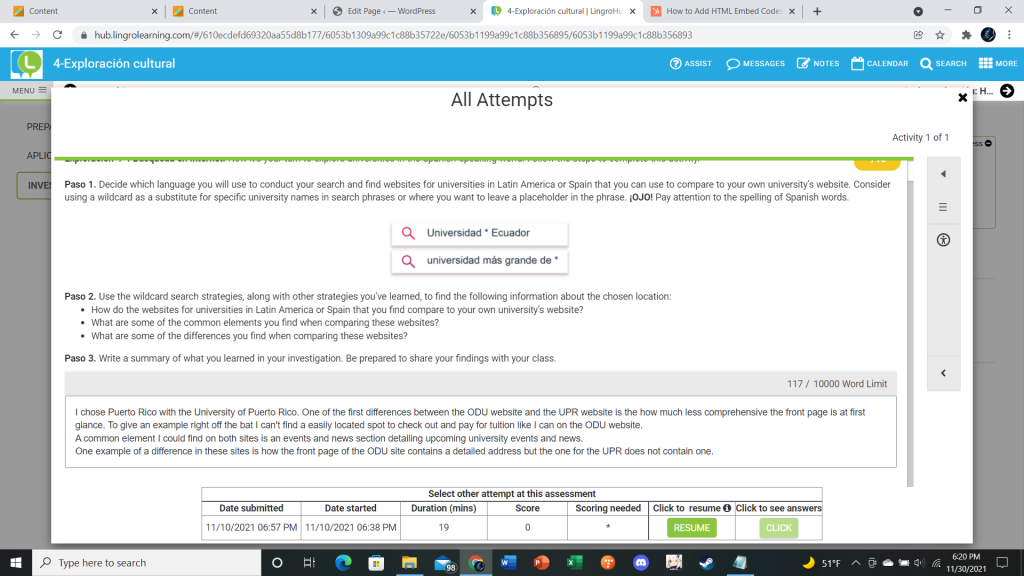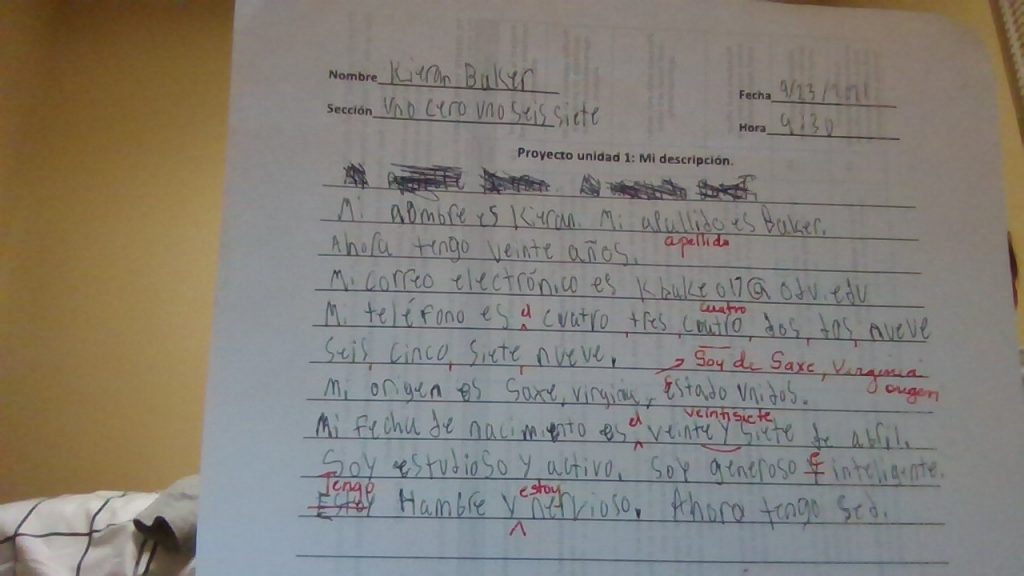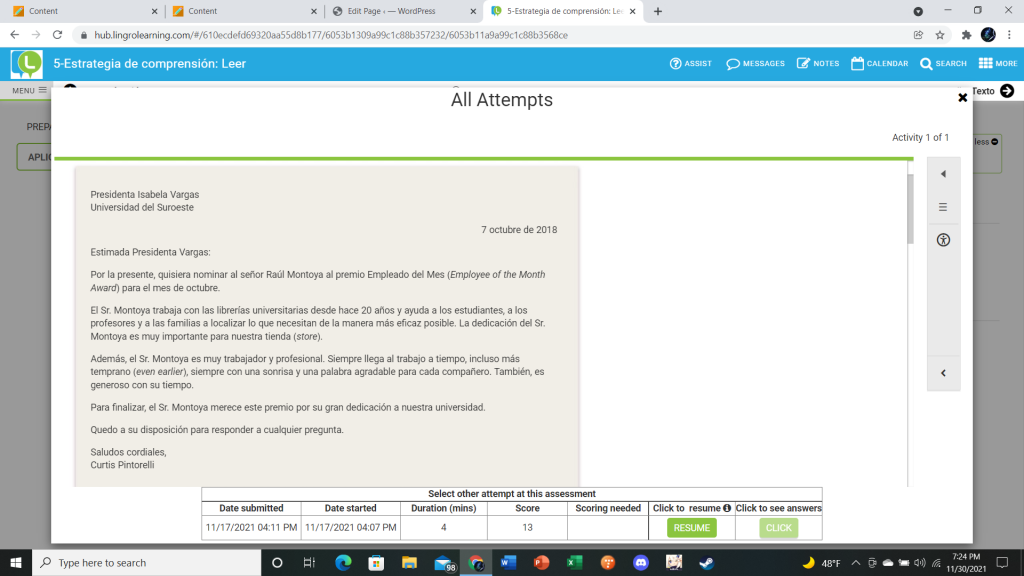Interpretive, Interpersonal, and Presentational Modes of Communication
Exploring Culture

When trying to learn more about Hispanic cultures a usefull skill I learned was how to search for more information about cultural elements easier and more accurately. What I learned is that searching in the primary language in that culture helps tremendously in finding accurate and relevant information. Alternatively, I would also search in english to see what type of info I would gain through my native langauge in order to learn the differences and what is priortized between my own culture and the ones I am researching.
Through this method I learned about a few key differences in experiences and culture from my own. As an example Siesta is a lot more common in spanish countries than in America where I live. Siesta is a rest period usually around lunch time where you can rest and then eat or the other way around. I personally do participate in this because I have found it helps me to be more rested and focused so I can work better and for longer periods of time. In the image above I researched the differences in college experiences between American colleges and Spanish ones. I found that in Spanish countries it is far more uncommon to have dorms and more often then not students rent appartments and get jobs while they are in college. On the other hand, in America dorms are the norm and if a student does get a job there are usually jobs on campus that students can apply for instead of off campus. I didn’t really have any changes in perspective after learning this information because I didn’t have enough info before to form any misconceptions that I could fix through this process. Overall, I found this to be a valuable experience in helping me to understand cultures different from my own.
Engaging in Communities

It is important to maintain contact and engage in your community because it every member of a community has some part to play and some value that could be beneficial to the betterment of that community. This is especially the case when considering the possibility of differences in culture or religion that could cause conflicts if not addressed as a community when making changes or improvenments.
I personally am a much more solitary person in my everyday life then most probably are. This makes it pretty uncommon for me to partcipate in community events. An event I particpated in recently is the event advertised in this picture that was posted on Campus Groups. This was a Halloween event with the theme focused around culture and how to spot cultural appropriation and avoid doing it ourselves.
Interpersonal Communication
In my spanish class this semester we had many opportunities to practice our interpersonal communication skills in spanish. To start with we frequently go over the vocabulary and grammar for the units in all of our classes. To add to this every once in a while we practice composing sentences and responding to them in the class room to further our communication skills. This usually developed into projects such as the one in the video interview above this paragraph. Outside of class we usually have audio assignments where we respond with the appropriate responses and record them into LingroHub.
When it comes to these types of assignments they usually help me alot with learning how to more smoothly arrange sentences and respond to them at a faster pace more accurately. I frequently find it to be rather difficult to remember vocabulary when I need it. To improve on this I usually just have to try an study extra with the vocabulary. On the other hand, I usually do pretty well on the more basic interpersonal questions such as the ones in the video interview above. I learned from these activities how to improve on my interpersonal skills and I have definitely gotten better since those assignments on these types of interpersonal skills.
Presentational Speaking
One of the presentational acctivities I have done this semester is a video presenting three common places around campus I go to. In this video I describe what these places are like, what they are for, and what I do in them the most.
I did two video presentations in this class. In the first I did an interview with another student in my spanish class. In this interview I displayed and worked on my abilities in basic conversational questions and answers such as “what is your name” or “where are you from”. The other one is the video above where I displayed my ability and familiarity with introducing places on campus and saying what I would do in them. I found times where I frequently just couldn’t remember either the correct way to repsond or introduce the places mentioned in the video. I found that the only way to really get better at this is to just practice as much as I can. In the first video I definitely think I would make more efforts to ask my partner in the video to either slow down what they said or repeat it so I can understand easier what they are saying.
Presentational Writing

One of the very first projects we did in this spanish class was a composition about ourselves. Another composition we did was a composition about our personal schedules throughout the week. The above picture is a picture of my own composition about myself describing facts about myself.
In the first assignment my main problem was actually remembering where certain words go. Aside from that I usually really only made mistakes on the spelling of some of the terms used in my composition. In the second assignemmnt about my schedule I found that my composition was very repetetive sounding when read. On the other hand the actual mistakes I made for that assignment was my inability to remember certain key word such as “Voy” when expressing things I would or had to do that week. I also frequently made mistakes on how to word the actual times or dates for the things I word do and how often I would do them that week. There were also cases where I just forgot some important phrases for the type of composition I was doing. The only way to improve on that for me is to look into where I made mistakes and study and extra amount for it as well as looking up examples of how to do it better by seeing hoe others do it.
Interpretive Listening
One of the earliest listening activities completed in this class would be the one in the video above. In this video two students who are going to be roomates have their first interactions as they start to get to know each other. Other common listening activities throughout the semester are audios that we frequently listen to thoughout the units that we then try to answer questions about or respond accurately to.
This first dialogue in the video above was perhaps one of the easier ones to pick up on and understand. This is especially the case because of the fact that It is an interaction between someone who is a native in spanish and someone who is learning. This made it easier to pick up on what was happening because there were moments where they slowed down and explained what they were saying to each other. This was especially beneficial considering how it framed very clearly the correct way to approach someone when using spanish when you are still learning and how to communicate more clearly to each other despite that. Over all the actvities the one thing I have had the most difficult with is picking up on the individual words and how they relate to each other. Over time I have gotten better at this by just having constant exposure to conversations in spanish through class and these assigments.
Interpretive Reading

Throughout this semester we have had a lot of different types of interpretive reading. Frequently, we have access to instructions and paragraphs in spanish where we have to interpret the meaning in order to answer the questions about them or fill in the blanks. It is also common to have to do interpretive reading in the culture sections of the units because of what and how we have to search up the info.
The letter in the image above fufills two purposes connected to interpretive reading. The first is just acting as a part of an assignment where we had to fill in the blanks for a return letter and answer questions about how to do it based on how this first letter was framed. The second purpose of this letter was to act as an example of how we are to do the fifth project where we are required to write a letter about someone we admire. I had the most difficulty picking up and understanding the info in the body of the letter. On the other hand it was especially easy to understand the beginning and end because of how letters are commonly framed doesn’t really change much despite being in a different language. When it comes to what I have gained from other similar assignments they have mainly helped me grow in regards to reading more clearly in spanish and understanding better all the ways sentences are commonly framed in spanish compared to english.